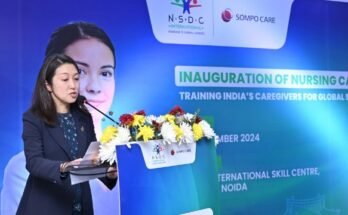New Delhi : The National Skill Development Corporation (NSDC) plans to review its target of providing vocational skills to 150 million Indians by 2022. The aim is to set a more realistic and achievable target.
NSDC is in talks with the government to set a new target, Manish Kumar, managing director and chief executive officer, said in an interview. “This conversation is underway and any such decision will only be taken in due consultation with the industry and the ministry of skill development and entrepreneurship,” he said.
NSDC was mandated to train 150 million people as part of the National Skill Development Policy 2009, which set out a target of providing job skills to as many as 500 million by 2022. The latter target was lowered to 400 million in the National Skill Development and Entrepreneurship Policy 2015.
So far, NSDC has trained just 11.51 million candidates through training partners (7.5 million were skilled) and schemes including the standard training assessment and reward scheme (1.4 million skilled), Pradhan Mantri Kaushal Vikas Yojana (PMKVY) 1.0 (1.98 million) PMKVY 2.0 (584,701 skilled so far) and 22,237 under Udaan, an initiative targeted at Jammu and Kashmir.
“NSDC’s target till 2022 is to be recalibrated looking at the overall rationalization of the country’s targets, prevalent GDP (gross domestic product) growth rate, capacity created by NSDC training partners, migration trends, Make in India initiative, automation trends and other factors affecting Industry 4.0,” said Jayant Krishna, executive director and chief operating officer, NSDC.
PMKVY 1.0 closed on 7 March 2016 and placement data available to date suggests that more than 18% of the candidates who passed have been placed in jobs. Kumar said placement tracking was not mandatory under the scheme.
An expert said all skill development agencies should now look at building a sustainable, job-creation led skill development ecosystem rather than fulfilling targets.
“The government should consider setting output-based parameters (like how many skilled candidates have been placed, how many have become entrepreneurs, etc) over input-based metrics which are just quantitative enrolment/certificate numbers,” said Narayanan Ramaswamy, partner and head of education and skill development, KPMG in India.
NSDC is also revamping its research agenda, moving from publishing skill gap reports to a more comprehensive one drawing on market intelligence, data-driven insights, workplace and technology trends.
“As part of this plan, NSDC is in conversation with reputed academic institutes like IIM (Indian Institute of Management)-Bangalore to explore impact of skilling on salary levels, particularly in informal sectors,” Kumar said.
Note: News shared for public awareness with reference from the information provided at online news portals.



